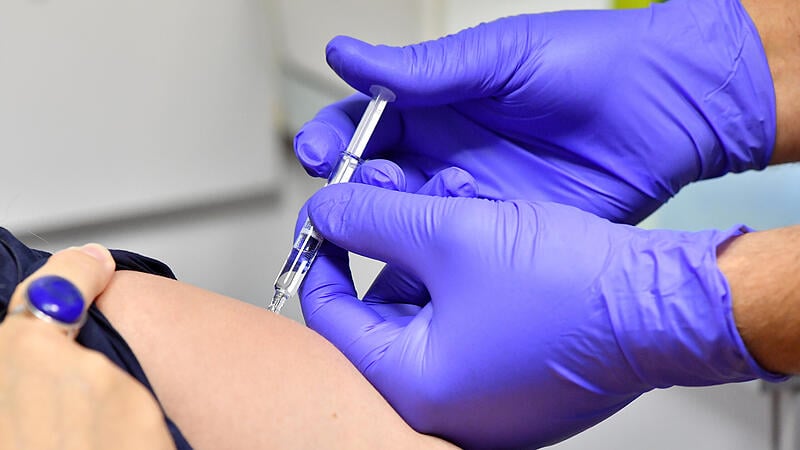Image: dpa-Zentralbild/Martin Schutt
The corona pandemic has been in the background for some time now. A few days ago, the World Health Organization (WHO) even lifted the international health emergency. Nevertheless, opponents of the corona measures continue to spread well-known misinformation, for example that the corona vaccination is not safe for pregnant and breastfeeding women and their babies. This would be documented by Pfizer documents from 2021, according to the online articles (such as here or here).
Assessment: The data do not support this conclusion. Studies by well-known specialist journals from 2021 and 2022 identified no safety concerns for pregnant women who had received the corona vaccination. The vaccination is recommended by the US health authority CDC and the Austrian Society for Gynecology and Obstetrics (OEGGG), among others.
Examination: The document to which the online contributions refer can be found on a website of the group “Public Health and Medical Professionals for Transparency” (PHMPT). The organization, using the Freedom of Information Act (FOIA), required the Food and Drug Administration (FDA) to release all data that led to the approval of Pfizer’s corona vaccine.
The FDA is the US drug agency. The Freedom of Information Act is a US law that allows people to request access to government documents.
In January 2022, a Texas court ruled that the FDA must issue tens of thousands of pages each month. The PHMPT then published hundreds of these documents on its website without comment. Among them is the one about pregnant and breastfeeding women, which is now being spread on social media – but it does not prove any vaccination risks.
The document was signed by a person named Robert T. Maroko. The name appears regularly in medical articles on vaccination topics and the man works at Pfizer, according to a LinkedIn post.
Content of the Pfizer document: The document lists cases of side effects that are temporally related to the BioNTech/Pfizer vaccination. They come from Pfizer’s “Pharmacovigilance (Safety) Database”. The starting point is therefore the start of development of the vaccination – although no exact date is given – until February 28, 2021. It is about women who were pregnant at the time of the vaccination or who were breastfeeding.
The Pfizer database consists of reports that were either made directly to Pfizer or to health authorities or that originated from medical literature or studies. The reported side effects or incidents (“adverse events”) do not have to be causally related to the vaccination, it is also said.
673 such cases were received. 458 of these women had just been pregnant, 215 had just breastfed their baby. Side effects were reported in 248 of the pregnant women. 53 women had miscarried, but 13 were women who had a medical history of endometriosis, miscarriage or irregular periods, and one woman with Covid-19. These were excluded from the report. The remaining 39 cases are detailed on pages four and five.
Significance of the Pfizer document: The online article is misleading as it draws the wrong conclusions. It is suggested that it has been proven that the side effects described are causally related to the corona vaccination – which is not the case. The data in the report is at most a partial listing of women who were vaccinated during pregnancy and subsequently experienced symptoms such as headaches, nausea or fatigue. These symptoms are very often associated with pregnancy and are not per se an indication of a vaccination side effect.
The same applies to the number of miscarriages that have occurred after vaccination. According to the reasoning of the online article, 39 cases of miscarriage would be 15.7 percent of the 248 named pregnant women. Even assuming these numbers are valid, they do not suggest that vaccination poses a high risk to fetuses or babies.
Because, as already described in an earlier APA fact check, according to the medical journal “The Lancet” (2021), the overall risk of suffering a miscarriage is 15.3 percent of all perceived pregnancies. The US foundation “March of Dimes” put the risk at ten to 15 percent. The US organization Planned Parenthood named ten to 20 percent. According to the scientific information portal “Science Direct” (2019), miscarriage is the most common complication in pregnancy. According to reports, 12 to 24 percent of women with a positive pregnancy test would have a miscarriage. It should be noted that miscarriages are not defined uniformly.
The number of cases reported is small compared to the total BioNTech/Pfizer vaccines administered. The danger of erroneous conclusions is addressed in several places in the report, such as on page seven: “It is important to note that the database (…) is intended for generating hypotheses and not for hypotheses testing”.
Vaccination recommendation from health institutions and research: In 2021, it was not without reason that numerous health institutions recommended that pregnant women be vaccinated against Covid-19 (note: the recommendation mostly referred to an mRNA vaccine). Among them were the US health authority Centers for Disease Control and Prevention (CDC) and the Austrian Society for Gynecology and Obstetrics (OEGGG).
This also applies to women who are breastfeeding. According to the OEGGG, the mRNA vaccine does not pass into breast milk, but the protective antibodies do. According to a small study, traces of the mRNA vaccine were detected in the breast milk of breastfeeding mothers shortly after the corona vaccination. According to the medical researchers, this does not pose any safety concerns.
Studies by well-known specialist journals such as the “New England Journal of Medicine”, the “Journal of the American Medical Association” or “The BMJ” from the years 2021 and 2022 identified no safety concerns for pregnant women who had received the corona vaccination.
In the most recent of the studies, that of “The BMJ” from August 2022, the summary says: “The Covid-19 vaccination is the safest and most effective way for pregnant women to protect themselves and their baby from severe Covid-19 The available data do not indicate an increased risk for pregnant women who have received a vaccination against Covid-19. Because the benefits of vaccination seem to outweigh any possible risks, it should be recommended.”
Source: Nachrichten




